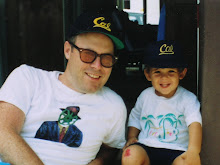Some years ago, before I had quit the Santa Cruz reading group to which I belonged (the drive over the hill was getting to be a bit too much for me), we decided to read Yann Martel's "Life of Pi."
I didn't know much of the book at the time, except that it had won the Booker Prize (a prize I've since come to associate with lackluster books of dubious quality). And hey, it had received many recommendations (even from a second-cousin of mine, who'd read it twice). It must be good, right?
Wrong!
Not long into the book, the author Martel (through his character Pi) makes the claim that this was "a story that would make you believe in God."
Whoa! What the hell did he just say? He's going to make me believe in God? Who doe this joker think he is, the second coming?
Right. Good luck, buddy!
I won't bore the reader with a detailed recounting of the plot, but I'll simply say that it concerns a boy marooned with a tiger in a lifeboat after the ship they were on sinks, and many fantastic things happen to the pair before their boat finally reaches safety. Now, Martel can sling together a sentence better than some, unfortunately he's way out of his depth thematically, and much of the book comes across as needless verbage: trite and unsatisfying. But what really raised my ire and caused me to throw the book across the room was the ending...
Pi is visited by two Japanese officials who need to file a report of how the ship sank. He recounts his story of his adventures with the tiger (annoyingly named "Richard Parker") , which the officials find enjoyable but not satisfying. Pi then relates a much darker, horrific (and in my opinion, much more realistic) tale, and asks them which of the two tales they prefer. The two officials admit that the lighter tale is the better one. "And so it goes with God," replies Pi.
What the hell? Was that supposed to make me believe in God? That we should believe in God because it's the prettier story, and that this was preferable to looking life, with all its beauty and its despair, full in the eye?
Who does Martel think we are, children? God, what a dork!
I was pissed off. I can't tell you what angered me the most: the arrogance of a hack writer like Martel actually believing that his story was an important story, and that I'd be swayed by it to believe in God, or that I'd wasted money and time on his ridiculous book.
Hell, I'm still pissed off! I could have used the bucks instead to buy a bottle of plonk. Martel - you owe me, you talentless bastard! Cough up!
Saturday, November 10, 2007
Wednesday, November 7, 2007
Why, of course there's a God!
From the 6 November 07 broadcast of The Newshour with Jim Lehrer on PBS. (Link to broadcast)
SUSAN DENTZER: This is one of the many memorials to the genocide in Rwanda that killed upwards of 800,000 people in 1994. Memories of that unspeakable horror still haunt many Rwandans to this very day, but many also told us that the battle against HIV and the U.S. assistance in that effort have played a role in the nation's post-genocide healing.
Nowhere is that more evident than here at AVEGA, the Association of Genocide Widows in Rwanda. That's where we meant Winifred Mukagihana, now 48. Her husband -- like her, a Tutsi -- was killed during the genocide, as were two of her three children. Imprisoned in a church, she was repeatedly raped by her Hutu captors, so many, she told us, that she lost count.
WINIFRED MUKAGIHANA, HIV-Positive Rwandan (through translator): After about a month and 20 days, there came a soldier who wanted to rape me. And I told him, "Please, instead of treating me like this, why don't you shoot me so that I can at least get some peace?" And he said that he cannot waste his bullets on me. That's when he got a bayonet and pierced me in the groin.
SUSAN DENTZER: Mukagihana was eight months pregnant with her late husband's child when the genocide ended. Her captors sliced her Achilles tendon so she could only crawl away.
WINIFRED MUKAGIHANA (through translator): I delivered the baby alive, but I couldn't move, and I couldn't help myself. There were dogs all over the place that came and ate my child. They ate my baby.
Just after the war, I tested positive for HIV, so I started coming just after the war, as soon as AVEGA was born. So they've been caring for me and providing me with treatment. They kind of became my parents.
SUSAN DENTZER: This is one of the many memorials to the genocide in Rwanda that killed upwards of 800,000 people in 1994. Memories of that unspeakable horror still haunt many Rwandans to this very day, but many also told us that the battle against HIV and the U.S. assistance in that effort have played a role in the nation's post-genocide healing.
Nowhere is that more evident than here at AVEGA, the Association of Genocide Widows in Rwanda. That's where we meant Winifred Mukagihana, now 48. Her husband -- like her, a Tutsi -- was killed during the genocide, as were two of her three children. Imprisoned in a church, she was repeatedly raped by her Hutu captors, so many, she told us, that she lost count.
WINIFRED MUKAGIHANA, HIV-Positive Rwandan (through translator): After about a month and 20 days, there came a soldier who wanted to rape me. And I told him, "Please, instead of treating me like this, why don't you shoot me so that I can at least get some peace?" And he said that he cannot waste his bullets on me. That's when he got a bayonet and pierced me in the groin.
SUSAN DENTZER: Mukagihana was eight months pregnant with her late husband's child when the genocide ended. Her captors sliced her Achilles tendon so she could only crawl away.
WINIFRED MUKAGIHANA (through translator): I delivered the baby alive, but I couldn't move, and I couldn't help myself. There were dogs all over the place that came and ate my child. They ate my baby.
Just after the war, I tested positive for HIV, so I started coming just after the war, as soon as AVEGA was born. So they've been caring for me and providing me with treatment. They kind of became my parents.
Tuesday, November 6, 2007
Saturday, November 3, 2007
Secrets of the De Anza Swapmeet REVEALED!
 At the September, 2007 swapmeet, Tamara Keith interviewed a number of the attendees (including me!) for a segment that aired on public radio. Hear it now at: Geek Flea Market
At the September, 2007 swapmeet, Tamara Keith interviewed a number of the attendees (including me!) for a segment that aired on public radio. Hear it now at: Geek Flea Market
Saturday, September 15, 2007
Belief and Reality
One lunch (long ago) a group of us from work were sitting around the table discussing nothing much in particular, when one woman (in her early 20's at that time) plaintively exclaimed, "I've been good. I deserve to be happy."
My jaw dropped. Did she really believe people actually deserve to be happy? And if so, did those whose lives, as Hobbes might say, are "mean, brutish, and short" actually deserve their misery?
Could this really be how life works?
Or is it more likely (as I prefer to believe) that events, either good and bad, sometimes fall upon us randomly, out of our control and irrespective of our qualities (be they noble or base), and we must deal with them as best we can?
I came across an essay by David Rieff in Harper's magazine one day while on a long train trip (trains and planes are great places to read and reflect upon essays), and it immediately clicked with me. Here's an extract which I had copied into my notebook:
(From "Victims All?" by David Rieff. Harper's Magazine, October 1991:)
..."Beyond our innocent shores, it is understood that the past is not always knowable and never recuperable, that there is sometimes nothing to be done, and that reality conforms neither to our desires nor to our schemes, psychic or material. There is chance, and fate, and tragedy.
Of course, it is true that there is a group within the population who often do not know this or believe it. We call them children, and while we may envy them their ignorance, and their belief in the potency of their own wishes, we know that they are under a false impression. We also know, or should, that however much we may feel nostalgia for our childhood, there is no going back, no reprieve from adulthood, which is to say from consciousness. That is the splendor and misery of being an adult, a condition from which we should not want to and, more to the point, cannot recover.
...During the period that I was reading little but recovery books, I kept remembering an encounter I had seen once on television between reporters and the grieving father of one of the passengers killed when Sikh terrorists blew up an Air India flight over the Irish Sea in 1985. The weeping father had been shown coming out of the makeshift morgue that the Irish police had set up in a small coastal village, and no sooner had he done so than he was surrounded by hacks who bombarded him with questions. "What are you going to do?" one called out. To which, with astonishing dignity, the man replied simply, "Do? What do you expect me to do in this dirty world?" "
My jaw dropped. Did she really believe people actually deserve to be happy? And if so, did those whose lives, as Hobbes might say, are "mean, brutish, and short" actually deserve their misery?
Could this really be how life works?
Or is it more likely (as I prefer to believe) that events, either good and bad, sometimes fall upon us randomly, out of our control and irrespective of our qualities (be they noble or base), and we must deal with them as best we can?
I came across an essay by David Rieff in Harper's magazine one day while on a long train trip (trains and planes are great places to read and reflect upon essays), and it immediately clicked with me. Here's an extract which I had copied into my notebook:
(From "Victims All?" by David Rieff. Harper's Magazine, October 1991:)
..."Beyond our innocent shores, it is understood that the past is not always knowable and never recuperable, that there is sometimes nothing to be done, and that reality conforms neither to our desires nor to our schemes, psychic or material. There is chance, and fate, and tragedy.
Of course, it is true that there is a group within the population who often do not know this or believe it. We call them children, and while we may envy them their ignorance, and their belief in the potency of their own wishes, we know that they are under a false impression. We also know, or should, that however much we may feel nostalgia for our childhood, there is no going back, no reprieve from adulthood, which is to say from consciousness. That is the splendor and misery of being an adult, a condition from which we should not want to and, more to the point, cannot recover.
...During the period that I was reading little but recovery books, I kept remembering an encounter I had seen once on television between reporters and the grieving father of one of the passengers killed when Sikh terrorists blew up an Air India flight over the Irish Sea in 1985. The weeping father had been shown coming out of the makeshift morgue that the Irish police had set up in a small coastal village, and no sooner had he done so than he was surrounded by hacks who bombarded him with questions. "What are you going to do?" one called out. To which, with astonishing dignity, the man replied simply, "Do? What do you expect me to do in this dirty world?" "
Subscribe to:
Posts (Atom)







